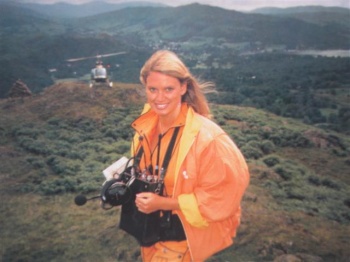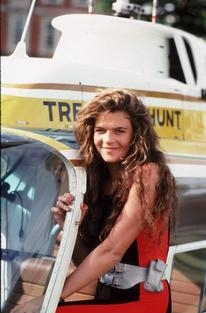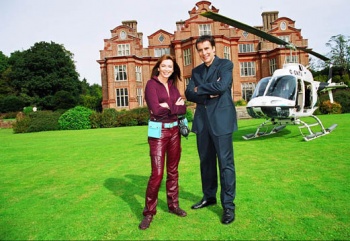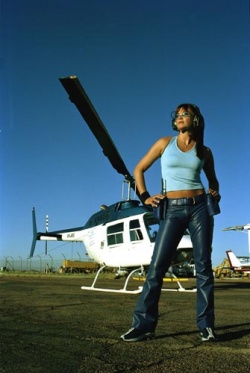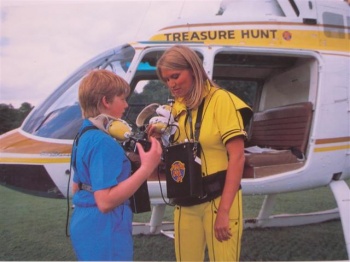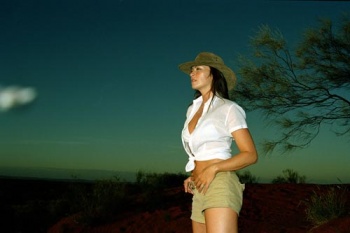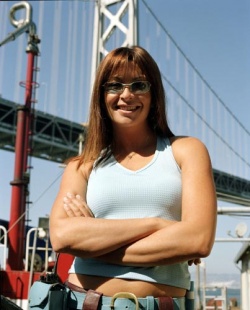Treasure Hunt (2)
(→Theme music) |
(→Trivia) |
||
| Line 138: | Line 138: | ||
A best-of programme in 1983 called ''Treasure Hunt: A Second Look'' featured Kenneth (in the chopper) and Anneka (in the studio) presenting highlights from the first series. In 1986, a behind-the-scenes doc ''The Making of Treasure Hunt'' was produced. | A best-of programme in 1983 called ''Treasure Hunt: A Second Look'' featured Kenneth (in the chopper) and Anneka (in the studio) presenting highlights from the first series. In 1986, a behind-the-scenes doc ''The Making of Treasure Hunt'' was produced. | ||
| + | |||
| + | A Welsh-language pilot, ''[[Helfa Drysor]]'', was produced for S4C. | ||
== Merchandise == | == Merchandise == | ||
Revision as of 13:49, 5 February 2007
Contents |
Host
Ned Sherrin (special episode)
Dermot Murnaghan (2002)
Co-hosts
Skyrunner: Anneka Rice (1983-8), Annabel Croft (1989), Suzi Perry (2002)
Adjudicator: Ann Meo (1983), Annette Lynton (1984), Wincey Willis (1985-9)
Cameraman (on location): Graham Berry
Video recordist (on location): Frank Meyburgh
Broadcast
Chatsworth for Channel 4, 1983-9
Chatsworth for BBC 2, 2002-3
Synopsis
If someone came up to you and said that Treasure Hunt was an hour of complete arse, not only do they have Touretts Syndrome, but somewhat ironically they would be almost completely right.
That's because the show is infamous for Graham the Cameraman's need to film Anneka Rice's bottom. In jump-suit as well! However, it was a groundbreaking game too, and one of Channel 4's most popular shows of the era, regularly clawing in 7-8 million viewers.
The game, then. Former BBC newsreader Kenneth Kendall helps two ordinary rich people to solve five devious cryptic clues in order to guide "Skyrunner" Anneka, transported by helicopter, around the five places of interest, usually on a 20x20 km map, within 45 minutes.
Part of the game was that although they could communicate with Anneka via a two-way radio link, they couldn't actually see her. An unintentional difficulty factor was that the radio communications would sometimes break up, completely by accident, at unfortunate times.
In the studio, the players have access to lots of reference works and they'll need them because the clues are somewhat cryptic. For example, one clue once was: "In a Seahawk, in a Seahawk, in a Seahawk." the contestants had to work out that an airbase in the area was known as the HMS Seahawk, and at that place was an actual Seahawk plane and inside that was a small model of a Seahawk plane, and the clue was in that. Often homonyms, anagrams, double meanings and other connotations needed to be solved, with a bit of quick research each time, to solve the clues.
 Kenneth Kendall tries to solve the clue, while Wincey Willis looks on.
Kenneth Kendall tries to solve the clue, while Wincey Willis looks on.For most of the run of the series, back at the base was TV-AM weather girl and zoologist (a combination you tend to see everyday) Wincey Willis who gave absolutely no help whatsoever save for time checks, giving out the clues in the studio and giving the hint to the Treasure at the top of the show. Part of her job was to track what the helicopter was doing on her big board which seemed fairly pointless, truth be told.
What made the show entertaining were the things Anneka had to do to earn the clues and the treasure. Most of the time they just had to go to a certain place, but sometimes the clue is on a character on stage at a packed performance, under the water, in the middle of an Army Assault Course obstacle - that kind of malarkey.
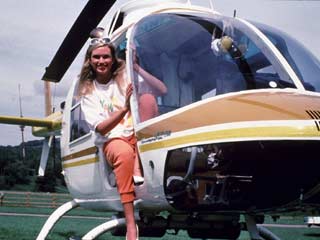 Skyrunner in the helicopter, Anneka Rice
Skyrunner in the helicopter, Anneka RiceEven when the contestants were stuck on clues, there was always plenty to look at. The view from the helicopter was interesting (Graham the cameraman always doing his "low shot" to perk up the proceedings), and Anneka tried her best to chip in with solving the clues wherever possible. Bless her.
The main problem with the format was that if there was only 3 minutes on the clock, and that the next location was miles away, we just knew they weren't going to make it. This was a bug that was solved in the next similar show in the genre, Interceptor. That said, Treasure Hunt got seven series, Interceptor got one. There's no justice.
In the final series of the original run, Anneka Rice was replaced by tennis-player Annabel Croft, who went on to do the afore-mentioned Interceptor with the same production team/helicopter crew combo (Chatsworth Television and Castle Air).
Bonus clues
It seemed like a few days since Annabel Croft ended the last run of Treasure Hunt by picking a rubber duck out of a reservoir in Derbyshire. After almost fourteen years in abeyance, the format has been revived for the BBC. In a pilot week, the show based itself in a Kent manor house, with five different routes being plotted around that region.
Suzi Perry was the new skyrunner. They can't see her in the studio, but they can hear her, and follow her progress via GPS. Perhaps the most visible change is that there are a lot more shots from the helicopter. Gun cameras to show Suzi and Keith, and new cameraman Guy and soundman Simon get more angles than Frank and Graham got in seven years on C4, though there's still the obligatory following-from-behind shot. There's a funky split screen effect, showing what's happening in the studio, and what's happening in the chopper.
Dermot Murnaghan is the host, furthering his claims to be taken as the new Kenneth Kendall. He's in a studio with lots of reference books and lots of good-looking but useless props but, in the one concession to new technology, there are CD-ROMs and a multimedia computer. As well as trying to help out the contestants, Dermot also confirms the location of the clue - a role Kenneth took in the initial C4 series, which acted without an on-screen adjudicator. And we're assured that, no, Dermot *hasn't* been given the answers beforehand. He does have an earpiece so that the producers can shout out if the contestants are (literally) miles off course, but that's all.
Very usefully, bits of the clue disappear as they're solved, so to admire that handiwork, you've got to be watching carefully. The effect is similar to the way Pete McCarthy explained the clues on radio's X Marks the Spot. And once Suzi has her hands on clues one and three, she gets to shout "Stop The Clock!" and use the break to reposition back at the helicopter.
Clue one is worth £100, clue two another £200. £300 for the third, £400 for the fourth, and £1000 for the last clue. Hmm, that would be exactly double the prizes on the old C4 version.
In many ways, this is perhaps a stronger show than C4's. We tend to forget the long transits and transfers between clues that Anneka suffered. The game is now five minutes shorter, which means five minutes less travelling time, which means less time filling in or looking out of the window, and no chopper work between clues four and five. The clues are also far less absurdly cryptic than on the C4 version.
The good news is that the sound problems between the studios and the skyrunner have mostly been ironed out, though that might be because the studio is within striking distance of the course. The bad news is that Zack Lawrence's memorable "Peak Performance" has vanished down the back of the BBC sofa, to be replaced by something far less memorable.
Dermot is dressed in a black jumper, not quite the learned schoolmaster of Kenneth, but still smart. Suzi is loud and talks a bit too much, but is nowhere near as annoyingly squeaky as Annabel Croft, and we have to remember that it took Anneka two or three years to really get her teeth into the skyrunner role.
There are some cute set-pieces - Dermot leaning out of the window to wave at the passing helicopter wouldn't have happened on C4. There's also indisputable evidence that Suzi does have a brain, and can solve these clues on her own bat. Quite where the obsession with pigs comes from remains to be seen - twice this week, Suzi went in search of some good porkers bearing canisters of fun.
Another good feature is the occasional screen of information on the places they've been, though bbc.co.uk/treasurehunt redirects to Auntie's attempts to recover tapes she wiped in the 70s. Very poor is the signal to indicate time has expired - Dermot counting "three ... two ... one ... oh dear" doesn't have the crashing certainty of the trusty old gong.
Oh, and the role of Wincey Willis? It's been taken by technology in general, and a GPS link to the helicopter (G-ONTV) instead.
While somewhat subdued, the show had a lot of promise, and surely a full series was in order...
An Englishwoman Abroad
And so there we were in the hot Summer of 2003 with some (extremely expensive) international specials hindered by the fact that it was an abnormally warm week for the time of year so nobody was in to watch it. Furthermore, it was Wimbledon and some Tim Henman matches went on so long that the show got jostled around the schedules.
On one week week we went to far flung places such as San Francisco on Monday, Mexico City on Tuesday, New Zealand on Wednesday, Alice Springs on Thursday and Melbourne on Friday. All very beautiful to look at and happily, the show's still as much fun as it always was although I feel it felt as if there was too much flying and not enough terra ferma hi-jinks early in the week.
The single biggest addition the new version of the show has bought along is that of having the treasure in the vicinity of the final clue. One of the biggest problems with the original of course was that if they get the fifth clue with only a few minutes to go you knew there would be no chance of them winning because the helicopter wouldn't get there in time. Now there is always a chance.
However, whilst in the original pilot week many of these final clues required a short run but needing to know an exact thing in order to win, a few too many of the final clues this time round have revolved around "Is Suzi fit enough to run from point A to point B, up a hill in time?" (the best example of this being on Alcatraz on Monday where she had to run up a large hill but Guy and Simon the technical blokes got to ride in a truck.
There is also a rather pointless addition of sound stings for when they light up the map, when they start the clock, when they stop the clock and when time runs out. Fine normally, except they're barely audible (so they're seen as irritants) and generally a bit pathetic. And there's no way the current time's up signal (a sort of wheeeeeeeee-[wind chimes]) conveys the same authority as the gong. Silly silly silly.
We like Treasure Hunt. But it never quite got there. And nobody saw it. Why the show never got a try out on Saturday early evening BBC 1 we don't know - it had enough production values for it. It was purely a question that BBC 2's loss of The Simpsons was the overriding factor to find something to plug the gap, and hang the cost.
In some ways the low-key nature of the failure may see it return again one day. We shall see.
Key moments
The spectacular seasonal specials, set in foreign countries.
Catchphrases
"Stop the clock!"
Inventor
Based on the French show La Chasse aux Trèsors.
Theme music
The famous theme tune was called Peak Performance, composed by Zack Lawrence. The 2003 edition was composed by Francis Haines (of Another 9 1/2 Weeks, no less). It was tweaked slightly between the pilot week and the full international series because Lawrence felt that they used a similar riff.
Trivia
The skyrunner's helicopter had the registration G-BHXU (pilot: Keith Thompson). The communications helicopter that flew alongside was G-SPEY (pilots: Geoff Newman and Michael Malric-Smith - see Interceptor).
The 1984 adjudicator, Annette Lynton, is married to Nick Mason from the group Pink Floyd. She still appears in various film and TV productions as an actress.
A best-of programme in 1983 called Treasure Hunt: A Second Look featured Kenneth (in the chopper) and Anneka (in the studio) presenting highlights from the first series. In 1986, a behind-the-scenes doc The Making of Treasure Hunt was produced.
A Welsh-language pilot, Helfa Drysor, was produced for S4C.
Merchandise
A Treasure Hunt book and board game was produced.
Web links
Martin Underwood's episode list
Expand Images (makers of the original French show and a spin-off called La Carte aux Trèsors).
Off the Telly review of original series
Off the Telly article of the come-back series

